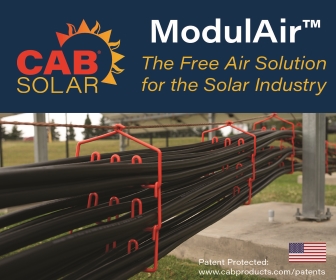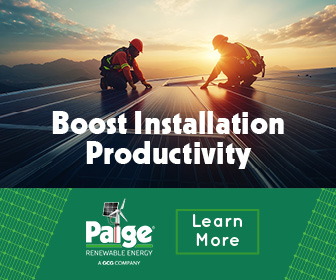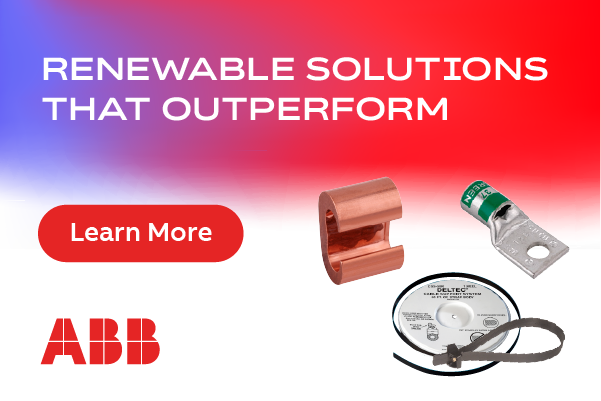Solar Safety is Up to You
 When it comes to solar technology, everything is new - including safety standards. Regulation and documentation from agencies like OSHA, NFPA, NEC, and others are trailing the equipment and facilities; the time- and practice-tested guidelines that have developed in other energy sectors don't yet exist for solar. So when it comes to safety standards and practices, the judgement of the solar technician in the field means everything.
When it comes to solar technology, everything is new - including safety standards. Regulation and documentation from agencies like OSHA, NFPA, NEC, and others are trailing the equipment and facilities; the time- and practice-tested guidelines that have developed in other energy sectors don't yet exist for solar. So when it comes to safety standards and practices, the judgement of the solar technician in the field means everything.
The worst that can happen
Thanks to training and personal experience, electricians bring a great deal of accumulated knowledge to every job. However, the market's hunger for solar workers is bringing in a huge influx of technicians with little experience beyond the basics. Yet it's the new technicians that are often the safest workers; more senior people tend to become complacent.
The worst thing that can happen on a job is getting away with it. Most incidents are less an accident than the result of a long line of small contributing factors (cutting a corner, forgetting PPE, or just doing a quick fix). If nothing happens, soon the shortcut can become a habit... and disaster becomes inevitable. When you're standing in front of the box, safety begins and ends with you.
Remember to ALWAYS:
#1 Check your tools
Use the right tools with the proper category rating for the job; in solar, that's CAT III. Use a tester to make sure your meter works before you head out to the other end of the facility.

"Test before touch" (TBT) verifies electrical test tools without placing the technician in potentially hazardous electrical environments.
#2 Wear the appropriate PPE
Personal protective equipment (PPE) is meant to protect you from serious injury or death in the event of a failure or transient voltage. Even with PPE, always use safe work practices when exposing yourself to a potential hazard. Working safely can be quick without cutting corners.
#3 Assume maximum potential until you verify otherwise.
Never assume you're safe. Be sure. Don't touch the panel or the cable until you test it, and test every circuit before you start working on it. Keep timing in mind, too; for example, if you're working on a solar module at night, be mindful of the time so you don't risk your safety and the job in a race against the sunrise.
Know the facility's DC health
Electricity always behaves as electricity, but each facility has its own considerations. What's the condition of the array you're working on?
When you're in the field performing periodic maintenance, such as wire management, module replacement, Voltage open circuit (Voc) checks, IV curve tracing, even vegetation management, you should be briefed or ask questions about the conditions you're working in. Depending on the scope of work, awareness of the equipment's condition and the electrical danger is paramount for safety; damaged modules, connectors or tracker arms can all be electrical shock hazards.
Safety means adapting to the environment
In solar, the environment around you is one of your biggest safety considerations because it can be so unpredictable - you work outdoors, in remote locations, and Mother Nature is always your partner. The electrical checks are the same, but the conditions in which you're making them are extremely variable.
Sun
At a solar facility, the sun will always be a concern in some way - whether it's clear or cloudy, whether you're working during the day or at night. Solar panels generate electricity from the sun's light, not its heat; they operate even with clouds in the sky. Your PPE can afford some protection, but use sunscreen where you're exposed and stay hydrated to avoid heat-related health issues.
Moisture
Water and electricity don't mix. Depending on the location and the season, however, you may be working in high humidity, standing water, rain, sleet, or snow. You could put on a full HRC IV arc flash suit, but if it gets wet, it's no protection at all. What if your tools get wet, or the leads, or the terminals, or your work area? Some manufacturers recommend against opening their cabinets when humidity exceeds a certain level; this particular recommendation can be open to some interpretation on site, so it's up to you to understand what moisture does to the electrical systems you're working on, the tools you're using, and the PPE you need to wear.

Water and electricity - and PPE - don't mix. Know how the situation will affect your tools and your work. (Photo courtesy Stephen San Juan)
Temperature
As a rule, electricity likes colder temperatures; solar modules can produce more current when it's cold. But even when there's cloud cover, it's dangerous to assume that the system is at anything less than maximum potential until you verify it yourself.
Wind
No universally-followed standard exists for stopping work under windy conditions. Most facilities use some system of wind advisories because high winds pose a danger not only to workers, but to the solar panels themselves.
Wildlife
On an established solar facility, all kinds of wildlife - including endangered and dangerous species - will return and thrive if given the chance. In some parts of the country, weed abatement is a critical means of wildlife control. In the high desert of California, black widow spiders and Mojave green rattlesnakes are a common hazard; in the southeastern U.S., alligators often lay claim to the territory beneath a solar array. Wasps can nest on or in cabinets. Understand the species you may encounter where you're working; be observant as you move and before you start work. And stay aware of your surroundings at all times.
Remember, safety procedures are only as good as the people who keep them. When it comes to solar, "the people" are you. Make safety your default. Taking time to be safe now saves time in the long run. It may even save your life.
Stephen San Juan is the co-founder and a managing member at Rise Renewable Energy, LLC, located in Tehachapi, California. After a career in the U.S. Navy, he pursued his interest in renewable energy, starting with the industry's largest solar inverter manufacturer as a Field Service Engineer. He went on to help create a qualified electrical worker training program that has certified over 800 employees, supporting the rapidly growing industry by providing new technicians with a mindset for safety. Stephen began his own company in 2021 to start giving back to the industry that continues to give so much to him.
Sean Silvey is a Product Specialist at Fluke Corporation. Fluke provides testing and troubleshooting capabilities for everything from industrial electronic installation, maintenance and service, to precision measurement and quality control.
Fluke | www.fluke.com
Author: Stephen San Juan and Sean Silvey
Volume: 2021 July/August









.png?r=7693)


